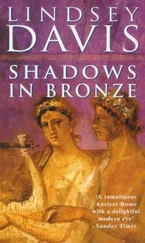Lindsey Davis - Master and God
Здесь есть возможность читать онлайн «Lindsey Davis - Master and God» весь текст электронной книги совершенно бесплатно (целиком полную версию без сокращений). В некоторых случаях можно слушать аудио, скачать через торрент в формате fb2 и присутствует краткое содержание. Жанр: Исторические приключения, на английском языке. Описание произведения, (предисловие) а так же отзывы посетителей доступны на портале библиотеки ЛибКат.
- Название:Master and God
- Автор:
- Жанр:
- Год:неизвестен
- ISBN:нет данных
- Рейтинг книги:3 / 5. Голосов: 1
-
Избранное:Добавить в избранное
- Отзывы:
-
Ваша оценка:
- 60
- 1
- 2
- 3
- 4
- 5
Master and God: краткое содержание, описание и аннотация
Предлагаем к чтению аннотацию, описание, краткое содержание или предисловие (зависит от того, что написал сам автор книги «Master and God»). Если вы не нашли необходимую информацию о книге — напишите в комментариях, мы постараемся отыскать её.
Master and God — читать онлайн бесплатно полную книгу (весь текст) целиком
Ниже представлен текст книги, разбитый по страницам. Система сохранения места последней прочитанной страницы, позволяет с удобством читать онлайн бесплатно книгу «Master and God», без необходимости каждый раз заново искать на чём Вы остановились. Поставьте закладку, и сможете в любой момент перейти на страницу, на которой закончили чтение.
Интервал:
Закладка:
But the events on the Capitol had affected him for life. His equilibrium was shaken. The sights and sounds of fire and mob violence, and his uncle’s ghastly fate, embedded themselves in his mind. From then on, Domitian trusted nobody and no situation. He had witnessed how good fortune could be snatched way. If the most senior and worthy men could end their lives torn limb from limb, what hope was there for anyone? At eighteen, having never held a military post, he was affected by this violence. His need for disguise and elusion that bleak night had taught him deep reserve, a personal wariness which he never again put off. Ten years later, the smell of the burnt temple on the Capitol was threatening to unman him.
He had to go up there. It was expected.
He stared as deferential vigiles produced protective boots and thick, hooded cloaks for the milling dignitaries. Someone must have hastily raided the cohorts’ stores for brand new boots. It would be unacceptable to push the illustrious corns of a consul into a pair that had been worn already by some horny-soled freedman stomping out sticky embers at a grain warehouse. Nice thought, though! As the Emperor’s brother, Domitian was provided with gear by slaves from the palace. He joked with an impassive dresser that a special battalion had charge of imperial disaster uniforms: National Emergency coveralls with delicious purple accents, boots with little gold wings on them for flying above catastrophes… Once kitted out himself, he coolly observed how the officers who were helping the others glanced at each other as they tried to advise the doddery old fools who now intended to go clambering over smoking ruins where there was still danger of collapse.
The Prefect of Vigiles gave a short, sensible safety lecture. Half the dignitaries were talking among themselves or wandering off. None of the great seemed to see the point of thick-soled boots, even though up on the Capitol the ground might be still red hot.
Domitian caught the Prefect’s eye and let a flicker of sympathy show. He had been taught to respect efficient men. After all, his down-to-earth father had viewed his role as emperor as merely doing an honest job. Vespasian also set an example of scoffing, in coarse language, at high-ranking droolers who had reached the limit of their competence but were still cluttering up the Senate.
Far too many introductions were made. A discreet official stood behind him, mentioning names so Domitian could greet people as if he remembered them. He made it plain he hated shaking hands, but merely inclined his head as long queues of officials paraded. However, he embraced the two consuls, because he knew Titus would have done so: mighty men sharing public grief for their damaged city. Titus would have freely wept on their togaed shoulders, but Domitian’s eyes stayed dry.
He reviewed the weary vigiles with respect for what the firemen had gone through. Their achievement in saving the main Forum and his father’s new amphitheatre deserved genuine thanks. A small number were presented to him while their Prefect read hastily scribbled accounts of individual bravery. Domitian made awards. Although in theory every honour needed the personal sanction of the absent Titus, his brother was permitted to make on-the-spot announcements of diplomas and cash gifts. Domitian brought it off with grace. He knew how to behave.
One man’s heroics caught his interest. The Prefect explained that this young fellow, one-eyed and hideously battle-scarred, had plucked a priest from certain death in front of the cult statues in the Temple of Jupiter. Domitian, who credited Jupiter with saving his own life on that terrible night on the Capitol, paid close attention. He seemed fascinated by the man’s scars too.
Later, the Prefect of Vigiles remembered this. By then the inspection party had snaked up the Gemonian Stairs to the heights, where they gasped at the ruined Temple and gasped again as they surveyed the destruction that stretched across the Field of Mars below. Lists of lost monuments were read out by a sombre works official. Then vigiles tribunes made themselves available to take questions. The senators all liked to think they were bright and well-informed. Some of their queries about how the fire had behaved and how the firemen tackled it were apt; some were stupid. After they had expressed horror over the tragedy, they began talking about rebuilding.
Classicus was on hand. He was secretary of finance to Titus; he normally stuck with the Emperor day and night, so Domitian wondered if Titus had sent him to spy on what happened today. If Domitian ever became emperor, this freedman would be the first retainer to go.
Classicus stated quickly that the Emperor would have to be consulted about costs. He had had no chance yet to ascertain how far Titus wanted to empty the Treasury and whether, given how generously he was already paying out after Vesuvius, he would contribute money of his own. Domitian, who was itching to involve himself but who had no remit, stayed silent but looked pinched.
As the VIPs pontificated, the troops were under orders to stick close and make sure none of the noble ones dithered into an unstable building or had half a column crack down on his head. Domitian had been frowning and withdrawn for a while. Suddenly he announced that he wanted to explore alone.
The City Prefect nudged the Prefect of Vigiles. This was an awkward breach of protocol. As a member of the imperial family, Domitian was entitled to bodyguards especially when he was representing his brother, but he had not asked and no Praetorian Guards had been arranged. It was still highly dangerous up here and no one who valued his job wanted to take responsibility for the young Caesar if he went off on his own. So the quick-thinking vigiles commander suggested that one of his own men should accompany the prince at a distance, to ensure his safety. He gave the nod to the man who had saved the priest. That was how, while Domitian went as close as possible to the Temple of Jupiter, Gaius Vinius trailed three yards behind.
They could feel heat still radiating from the ruins, so intense that the building seemed liable to burst into flames again. Enormous broken columns blocked their path. What remained of the gigantic building groaned afresh. Vinius knew that when you started to hear new creaks and shifts, it was time to leave. He wondered if he was allowed to speak up and alert his charge.
Domitian must have sensed danger; of his own accord he moved back and strode around the summit to the far side of the hill. Now they were isolated together, out of sight of the rest.
Domitian stood for a long time, gazing across the devastation below. Vinius placed himself nearby, also staring out over the Tiber, in that apparent trance good soldiers adopt to avoid irritating their officers. Domitian considered ordering him away but chose not to. He decided the man was not as dumb as he appeared, simply discreet. Vinius looked a little slumped, clearly having no energy left for the ramrod position his superiors would have wanted.
In turn, Gaius Vinius weighed up his companion. Domitian Caesar was not yet thirty, Vinius in his early twenties, so they had one thing in common: among the party who had come up to survey the scene — officers, magistrates and officials all in their fifth or sixth decade — they two were the youngest. Domitian was taller than Titus which probably pleased him, though shorter than Vinius. He was good-looking and well-made, though not muscular because he rarely took exercise. Around the eyes there was a noticeable resemblance to his father Vespasian, though unlike his brother he had a silly mouth, Vinius reckoned. Wrong teeth? Receding jaw? A section of his upper lip twisted slightly. The cause was not obvious. The mouth gave him a pleasant expression from one side, though from the other he looked weak.
Читать дальшеИнтервал:
Закладка:
Похожие книги на «Master and God»
Представляем Вашему вниманию похожие книги на «Master and God» списком для выбора. Мы отобрали схожую по названию и смыслу литературу в надежде предоставить читателям больше вариантов отыскать новые, интересные, ещё непрочитанные произведения.
Обсуждение, отзывы о книге «Master and God» и просто собственные мнения читателей. Оставьте ваши комментарии, напишите, что Вы думаете о произведении, его смысле или главных героях. Укажите что конкретно понравилось, а что нет, и почему Вы так считаете.












